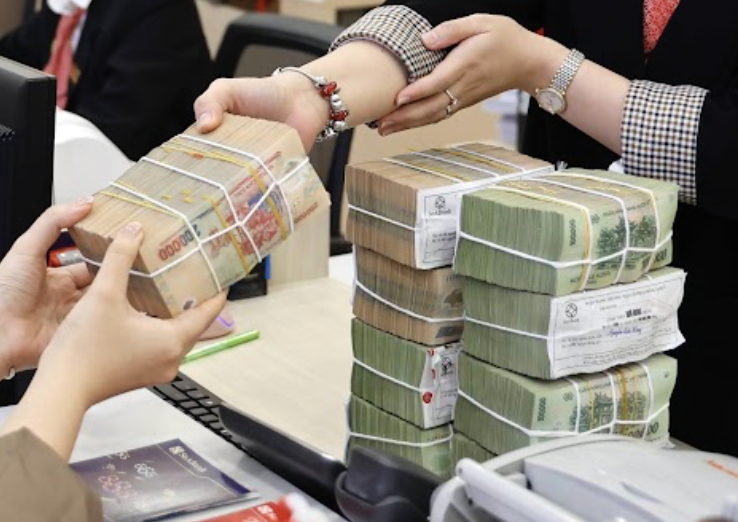(NLDO) - Savings deposits are an important source of income for people. If taxes are imposed, they should be applied to high-income earners or other types of taxes should be considered.
This is the opinion of Dr. Can Van Luc, member of the National Monetary and Financial Policy Advisory Council, when talking to reporters of Nguoi Lao Dong Newspaper about the proposal to tax savings interest.
The draft proposal on the development of the Law on Personal Income Tax (replacement) of the Ministry of Finance is attracting public attention, especially comments from the People's Committee of Can Tho City. Accordingly, this locality requested the drafting unit to study and expand the tax base, in the direction of only exempting personal income tax on interest on small-scale savings deposits and considering applying tax to high-income households.
Commenting on the above proposal, Dr. Can Van Luc said that savings deposits are an important source of income for people, mostly at the medium and low levels. If this tax is applied, it could have a negative impact on the economy . Because, if savings interest is taxed, it could reduce the amount of money deposited in banks. At that time, lending interest rates could be pushed up, affecting businesses.

Savings is one of the popular channels for people to invest their idle money, with deposits starting from just a few million VND...
"Taxing deposit interest is normal in developed countries, but it should not be done in Vietnam at present. In the future, if tax is imposed, it is necessary to determine the subjects, tax thresholds and only apply it to people with high incomes. In fact, people with low incomes are supported with social housing and have family deductions when calculating personal income tax. Therefore, other taxes should be considered to combat speculation, such as real estate tax, property transfer tax, and e-commerce tax," Dr. Can Van Luc analyzed.
Also contributing to this draft tax law, the Ninh Thuan Provincial People's Committee said that interest rates on savings deposits, government bonds and long-term investments should be exempted from tax to encourage savings and economic development.
Many people said they have savings ranging from several million to several tens of millions of dong. If interest is taxed, they may not save and instead buy gold or USD, which will cause consequences.
Economist, Dr. Dinh The Hien emphasized that savings deposits are one of the main capital mobilization channels for banks and the economy, from which there is a source of capital for lending to the market, promoting economic growth, especially in the context of credit capital from the banking system still playing a pivotal role. Therefore, the proposal to tax savings interest may cause many people to reduce their deposits in banks and tend to hold USD or gold.
"At that time, capital will stagnate instead of circulating into the economy, so this tax proposal needs to be carefully calculated and considered," Dr. Hien emphasized.
A few years ago, there was a proposal to tax interest on bank deposits, specifically large interest or savings deposits of VND1 billion or more... However, this proposal was met with opposition. Currently, interest on personal savings deposits is tax-free.
According to current regulations, individuals who receive interest from deposits from credit institutions are exempt from tax. These are deposits in the form of term deposits or deposits with no term, savings deposits, deposit certificates, promissory notes, treasury bills and other deposits with the principle of full repayment of principal and interest. Only income from interest on corporate deposits is subject to corporate income tax.
Speaking to reporters, Ms. Tran Thi Cam Hong, Director of VIFATAX Tax Consulting Services Co., Ltd., commented that the proposal of the People's Committee of Can Tho City means that individuals who deposit large-scale savings will be taxed on interest. "However, what is considered a large or small savings deposit?" - Ms. Hong wondered.
Ms. Hong said that currently, some banks offer high interest rates for depositors from tens of billions of dong to several hundred billion dong or more. However, it is very difficult for state management agencies to determine whether the deposit is for income generation or for daily living expenses. "Suppose an individual is depositing hundreds of billions of dong in the bank to prepare for future investments, then taxing the interest on this amount is unreasonable, may encounter negative reactions, and is very difficult to implement," Ms. Hong commented.
Dr. Le Dat Chi, Head of the Finance Department - Ho Chi Minh City University of Economics, expressed his agreement with the proposal of the Can Tho City People's Committee. He cited that in many developed countries, bank deposit interest is calculated into total income to determine tax, because this is also considered a source of income. Accordingly, all individuals with income must pay taxes, regardless of the size of the deposit, to ensure fairness.
Therefore, according to Dr. Le Dat Chi, in the long term, the state needs to collect all income of each individual, including interest on bank deposits, and integrate it into the citizen identification card to have accurate data for calculating personal income tax.
Source: https://nld.com.vn/danh-thue-tien-lai-gui-tiet-kiem-co-the-gay-tac-dong-tieu-cuc-19625021813055469.htm






























![[Photo] Discover the "wonder" under the sea of Gia Lai](https://vphoto.vietnam.vn/thumb/1200x675/vietnam/resource/IMAGE/2025/8/6/befd4a58bb1245419e86ebe353525f97)
![[Photo] Nghe An: Provincial Road 543D seriously eroded due to floods](https://vphoto.vietnam.vn/thumb/1200x675/vietnam/resource/IMAGE/2025/8/5/5759d3837c26428799f6d929fa274493)


































































Comment (0)